Table of Contents
I’ve been asked by Nootropics Expert® readers to write about a “Leaky Blood-Brain Barrier”. And the question naturally is what nootropics to use if you suspect you have a leaky brain. You’ll find the answers in this post.
Most of us are aware of “leaky gut” syndrome. It’s long been associated with Celiac disease and Crohn’s disease.
And increased interest in gluten sensitivity has led to food labels featuring ‘gluten free’ and gluten-free products in nearly every category of food you can think of in our supermarkets.[i]
This is a bigger deal than what most people think. The National Institute of Health reports that close to 20% of Americans suffer from a diagnosable mental disorder.[ii]
And serious mental illness causes $193.2 billion in lost earnings each year.
The same report says that depression and anxiety disorders cost the global economy $1 trillion in lost productivity each year. And depression is the leading cause of disability worldwide.
The thing is even if you can name the “diagnosable” mental health disorder, doctors often don’t know the cause.
So you end up with a prescription for some med that doesn’t work. Or it does work but the side effects are horrendous.
Turns out the cause may be a ‘leaky blood-brain barrier’. And if you have a leaky gut, chances are high that you’re dealing with a leaking brain too.
In this post you’ll find natural options for healing a leaky brain.
What is the Blood-Brain Barrier?
Your brain is protected by a 7 mm thick skull. And is surrounded by cerebrospinal fluid along with a protective membrane called the meninges. This is your primary defense against physical injury like a whack on the head.
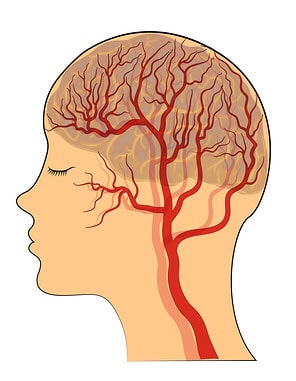 Your next layer of brain defense is your blood-brain barrier. This is a barrier between your brain’s blood vessels (capillaries) and brain cells and other tissues that make up your brain.
Your next layer of brain defense is your blood-brain barrier. This is a barrier between your brain’s blood vessels (capillaries) and brain cells and other tissues that make up your brain.
Its purpose is to tightly regulate the movement of ions, neurotransmitters, and other molecules between your general blood supply and your brain.
This precise control of your brain transports oxygen and nutrients to brain tissues while removing carbon dioxide and other waste.
It also promotes normal hormone and neurotransmitter signaling. And maintains control of the interaction between your brain and the rest of your body.
This allows optimal brain function while protecting your brain tissues from toxins, pathogens and other nasty stuff circulating in your general blood supply.
The Mechanics of your Blood-Brain Barrier
Endothelial cells line the interior of all your blood vessels. But in your brain, the Endothelial cells lining the inside of capillaries are held tightly and sealed together by ‘tight junctions’.[iii]
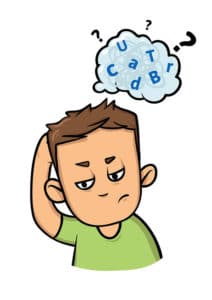 Tight junctions are made up of a network of claudins and cytoplasmic proteins, such as zonula occludens (ZO), and cingulin.[iv]
Tight junctions are made up of a network of claudins and cytoplasmic proteins, such as zonula occludens (ZO), and cingulin.[iv]
But your blood-brain barrier is not just surrounding and encasing your brain in a protective layer. This network of capillaries goes throughout most of your brain. And no brain cell is ever further than ~25 μm (micrometer) from a capillary.[v]
The thing is your blood-brain barrier is more than just a firewall protecting your brain.
Capillaries in select brain regions facilitate the passage of glucose and amino acids across your blood-brain barrier via carriers specific to that molecule.
This highly dynamic layer of cells works with transporters that allow oxygen, certain cytokines, hormones and some neurotransmitters that your brain requires to function.[vi]
The bottom-line is a healthy blood-brain barrier is your last line of defense keeping bad things out of your brain. And allowing the good stuff through.
But a leaky blood-brain barrier, just like a leaky gut, can lead to a whole host of problems.
Signs you may have a “Leaky Brain”
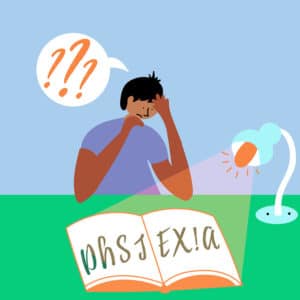 I’ve written about the causes of brain fog, memory loss, chronic fatigue, anxiety, and depression. And how each of these can often be corrected with nootropic supplements.
I’ve written about the causes of brain fog, memory loss, chronic fatigue, anxiety, and depression. And how each of these can often be corrected with nootropic supplements.
But if you’ve tried my suggested nootropic stacks in the past for each of these issues and nothing has worked. It could be a leaky blood-brain barrier.
Because clinical studies show that a leaky blood-brain barrier can be the cause of brain fog, cognitive dysfunction, chronic fatigue, anxiety, and depression.[vii]
And if you’re dealing with a leaky gut, chances are you’re suffering from a leaky blood-brain barrier as well.[viii]
A classic example of this is Celiac disease. If you’re dealing with Celiac disease chances are, you’re also suffering from seizures, headache, cognitive impairment, or other psychiatric disease.[ix]
What causes a leaky brain?
I have touched in the past on ‘leaky gut syndrome’ when writing about Psychobiotics and your gut-brain connection.
Recent research shows that a leaky gut is often associated with a ‘leaky brain’.[x]
Elevated antibodies
 The proteins claudin, occludin, and zona occluden proteins (ZO-1, ZO-2, and ZO-3) are required for the integrity of the tight junctions in your gut barrier lining, and a healthy blood-brain barrier.
The proteins claudin, occludin, and zona occluden proteins (ZO-1, ZO-2, and ZO-3) are required for the integrity of the tight junctions in your gut barrier lining, and a healthy blood-brain barrier.
Problems start with elevated antibodies against occludin and zonulin. Which often leads to leaky brain syndrome.
Lab work can determine if you have elevated levels of antibodies against occludin and zonulin. Blood tests can measure antibodies against these two proteins. Because it it’s left unchecked, tight junctions that seal your gut- and blood-brain barrier are compromised. Resulting in brain and gut permeability.
Inflammation
Research also shows that microRNAs (specifically microRNA-155) are key regulators in inflammation and blood-brain barrier permeability.[xi]
When inflammation goes up, your blood-brain barrier breaks down. And let’s nasty stuff into your brain. Resulting in damaged neurons and a “self-propelling cycle of neuron death.”[xii]
This area of neuroscience has come to be known as the “cytokine model of cognitive function.”[xiii] Elevated proinflammatory cytokines often result in brain inflammation which can lead to anxiety, depression, brain fog, and other autoimmune brain problems.[xiv]
There’s even a “cytokine hypothesis of depression”.[xv]
The bottom-line is inflammation can be the cause of your anxiety, depression, brain fog or some other cognition issue.
If you’ve tried nootropics or meds and have not experienced any relief, it could be inflammation and a leaky blood-brain barrier that is causing your symptoms.
Homocysteine
High homocysteine levels have been linked to a damaged blood-brain barrier.[xvi] Get your homocysteine levels checked the next time you get your labs done.
Blood sugar
High blood sugar is also a risk factor for developing a leaky blood-brain barrier.[xvii] Get your labs done for fasting blood sugar and Hgb A1C to find out if you’re blood sugar levels are high.
Bacterial overgrowth
We’ve touched on the gut-brain axis earlier. And with these two linked, it makes sense that a bacterial imbalance and Candida overgrowth in your gut can result in cognition problems and even depression or anxiety.
When Candida gets out of control, it creates a layer in your intestines. Which suppresses the production of neurotransmitters like serotonin.
Antibiotics are often prescribed to treat Candida overgrowth and other bacterial infections. Often leading to yeast overgrowth.
If you find that Candida is out of control, your first option is to eliminate sugar of all forms including desserts, candy, alcohol, and flour. And cut back on refined grains, beans, bread, pasta, white potatoes, and fermented foods.
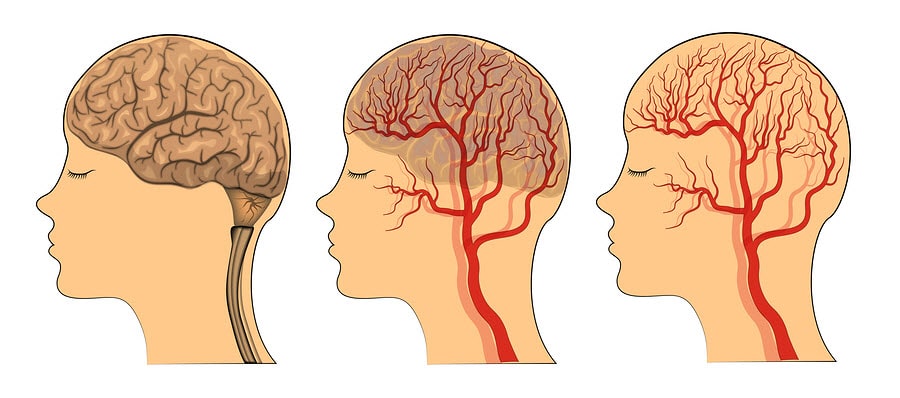
Best nootropics to fix a leaky blood-brain barrier
If you’re dealing with a leaky blood-brain barrier, nootropics can help tame inflammation and restore the integrity of the tight junctions needed for a healthy blood-brain barrier.
The following nootropic supplements have been clinically proven to help tame inflammation and heal a leaky blood-brain barrier.
You can safely use ALL the nootropics I’ve detailed below in a single nootropic stack at the recommended dosages.
NOTE: each nootropic below contains a live link that will take you to my full review of that supplement. Which includes what it is, where it comes from, why we use it, how it works in your brain, clinical studies, dosage recommendations, side effects and forms or type of supplement to buy.
Berberine – 500 mg 3-times per day
Berberine is a bright yellow alkaloid extracted from plants such as Indian Barberry (tree turmeric), Oregon Grape and goldenseal.
As a nootropic, Berberine increases cholinergic activity, restores Brain-Derived Neurotrophic Factor (BDNF), and cAMP-response element-binding protein and mRNA expression in your hippocampus.
Berberine also decreases proinflammatory cytokines like interleukin-1β, tumor necrosis factor-α and cyclooxygenase-2 mRNA in the hippocampus.[xviii]
Studies show that Berberine can also reduce the permeability of a leaky blood-brain barrier. Primarily by reducing inflammation.[xix] [xx]
Caffeine – up to 200 – 400 mg per day
Caffeine is an adenosine antagonist which influences acetylcholine, epinephrine (adrenaline), serotonin and boosts the use of dopamine. Providing the stimulant effect, you get when consuming caffeine.[xxi]
Caffeine also provides a protective effect by boosting gene expression of brain-derived neurotrophic factor (BDNF).
Studies show that caffeine blocks increase in IgG and fibrinogen and decreases in tight junction proteins occludin and ZO-1, increases in astrocytes activation and microglia density where IgG leakage was present. Protecting the integrity of the blood-brain barrier.[xxii]
Curcumin extract (95% curcuminoids) 750 mg 3-times per day
Curcumin is the primary active compound in Turmeric. And research shows curcumin boosts neurogenesis. More neurons mean better learning, memory, and mood.[xxiii]
Curcumin is also a potent antioxidant and helps protect your brain from inflammation.
A study at China Medical University found that Curcumin helps prevent disruption of the blood-brain barrier after a stroke.
The researchers found that Curcumin restored the expression of occludin and ZO-1 proteins which in turn restored the barrier function of the blood-brain barrier.[xxiv]
DHA (Omega-3) – 1,000 mg per day
DHA is an Omega-3 fatty acid which makes up much of the gray matter in your brain. Your brain is about 60% fat. And much of that fat is DHA. It’s a critical part of healthy and fluid brain cell membranes.
DHA can boost brain-derived neurotrophic factor (BDNF), regulate calcium oscillations which are involved in neurotransmitter release, boost mitochondrial function, gene activation, oxidative stress, and reduce inflammatory COX-2 enzymes.
Research also shows that DHA can reduce blood-brain barrier damage after a stroke[xxv], after traumatic brain injury[xxvi], and help repair a leaky brain in multiple sclerosis (MS) patients.[xxvii]
L-Glutamine – 2 – 5 grams per day
L-Glutamine is an essential amino acid and precursor for the synthesis of glutamate.
We use L-Glutamine to treat a leaky blood-brain barrier because it helps boost your body’s immune response. It increases antibodies to fight against viruses and harmful bacteria.
L-Glutamine also helps tame inflammatory cytokines which can be harmful to tight junctions needed to keep your blood-brain barrier healthy.
And it detoxes your brain from excess ammonia by converting it into other amino acids, sugars, and urea.
Magnesium – 400 mg before bed
Magnesium deficiency is nearly epidemic in our society because it is sorely lacking in our food supply.[xxviii]
The thing is magnesium is the 4th most abundant mineral in your body. And is a cofactor in more than 600 enzymatic reactions.
You need magnesium to produce adenosine triphosphate (ATP) which is your primary source of energy. Magnesium is required for the synthesis of RNA and DNA[xxix], and regulates ion channels which govern the flow of neurotransmitters.
One animal study showed magnesium reduced blood-brain barrier permeability caused by sepsis.[xxx]
Another study showed magnesium supplementation reduced blood-brain barrier permeability caused by high blood pressure.[xxxi]
And yet another showed magnesium prevented blood-brain barrier breakdown after traumatic brain injury.[xxxii]
Resveratrol – 250 mg per day
Resveratrol is a naturally-derived polyphenol antioxidant used to protect your brain from oxidative stress.
It increases cerebral blood flow, boosts BDNF, protects mitochondria, and prevents the release of toxic glutamate during a stroke.[xxxiii]
One study had 19 Alzheimer’s patients take 1,000 mg of Resveratrol daily for one year. The study found it reduced matrix metalloproteinase-9 (MMP-9) levels in the cerebrospinal fluid by 50%. This MMP-9 decreased when sirtuin1 (SIRT1) is activated.[xxxiv]
High levels of MMP-9 weaken the tight junction of the blood-brain barrier. Conversely, low levels of MMP-9 help maintain a healthy blood-brain barrier.
Another study showed Resveratrol decreased nuclear factor kappaB (NF-κB) and the increased Claudin-5 which strengthened the integrity of tight junctions in the blood-brain barrier.[xxxv]
Vitamin D3 – 4,000 IU’s per day
Vitamin D3, the “sunshine vitamin”, as a nootropic supplement is critical for optimal cognitive health.
It’s an integral part of neurotransmitter synthesis, gene expression, DNA maintenance and repair, and the forms of neuroplasticity needed for memory formation and retrieval.
But Vitamin D deficiency (hypovitaminosis D) is an undeclared worldwide pandemic affecting nearly 50% of the population on this planet.
Research shows that Vitamin D helps maintain blood-brain barrier integrity by blocking the increased production of reactive oxygen species (ROS), and nuclear factor kappa B (NF- kB) activation. And increases levels of the tight junction proteins occludin, claudin-5 and ZO-1.[xxxvi]
And another animal study showed Vitamin D supplementation reduced blood-brain barrier permeability.[xxxvii]
Several of the B-Vitamins have been clinically shown to help prevent a leaky brain and support the blood-brain barrier.
Vitamin B1 (thiamine) – Thiamine is a required cofactor in the synthesis of acetylcholine, is part of the KREBs cycle that produces adenosine triphosphate (ATP), is needed for the synthesis of myelin, and helps maintain optimal levels of glutamate and GABA.
Thiamine deficiency can be caused by alcoholism, Alzheimer’s Disease, anemia, athletes who reduce food intake, cancer, clogged arteries, Crohn’s disease, diabetes, diarrhea, gastric bypass surgery, consuming large amounts of coffee and tea, and kidney disease. And even a poor diet.
Severe thiamine deficiency (Wernicke encephalopathy) causes damage to the integrity of the blood-brain barrier. Which can quickly be reversed with one week of thiamine supplementation. [xxxviii]
Vitamins B6, B9 & B12 – work together to keep homocysteine levels in check.
Homocysteine is an inflammatory compound and when levels are excessively high can break the integrity of the blood-brain barrier.
Studies show that supplementing with B6, B9 & B12 will bring homocysteine levels down to normal levels and restore the integrity of the blood-brain barrier.[xxxix]
Leaky Brain Summary
We’ve defined what the blood-brain barrier is and why it’s so critical to your overall cognitive health.
We looked at the causes of a leaky blood-brain barrier. And how to fix it.
We also discovered that if you’ve got a leaky gut, chances are your brain is leaky too. If you fix one, you’ll make great strides in fixing the other.
All the nootropics I’ve detailed above can be used daily as a single nootropic stack if you’re dealing with a leaky brain. Just follow the dosage recommendations and you should be fine.
If this is your first time using any of the above supplements, start with one at a time. Use it for a day or two. And if you don’t experience any problems. Add the next on the list.
Heal your leaky brain naturally and watch the symptoms of brain fog, memory loss, chronic fatigue, anxiety, and depression get less and less over time.

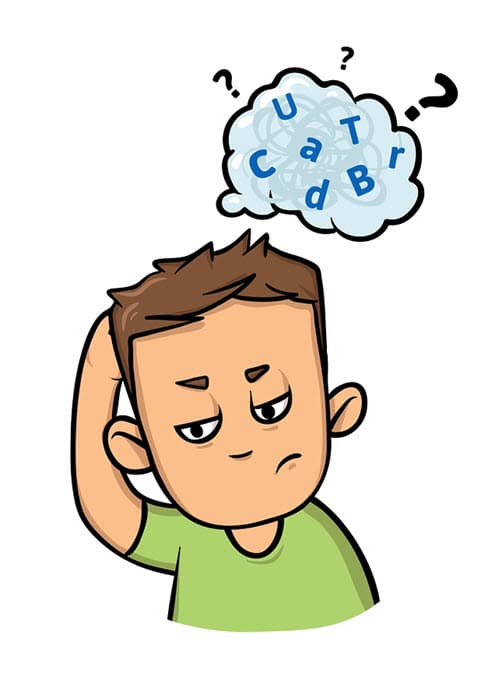






Join The Discussion - 39 comments
Julia
April 14, 2021
Hi, I have a question could I heal my blood brain barrier from a pcr test injury? I started leaking fluid after getting the test and am also getting headaches, the hospital does not want to admit it’s because of the test that went too deep
David Tomen
April 15, 2021
Julia, it the problem really is a leaky brain then the supplements I describe above should help you. It will take dedication and consistent use every day but they do work.
Dr. Aziza Ouarab-Ring
February 1, 2021
Hi David,
what is the best time to take these supplements. Which ones in the Morning, during the day an evening/ vor sleep.
Thanks
Aziza from Germany
David Tomen
February 2, 2021
Dr. Aziza, each supplement I detail above has a live link that takes you through to my full report on that supplement. Which includes dosage recommendations (amount and how many times per day).
So if I recommend you use 750 mg 3-times per day that means 750 mg in the morning, then again at noon, then again late afternoon.
A couple of them you only dose once and that is generally in the morning. For example, DHA (Omega-3s) and Vitamin D3 are once in the morning because they could be stimulating. Magnesium 400 mg is usually before bed because it helps you sleep.
Owais
July 17, 2020
Hi David.
In your list of nootropics for fixing a leaky gut, you’ve mentioned caffeine. Isn’t this addictive? How will one deal with the withdrawal once one chooses to stop using it?
Thanks
David Tomen
July 18, 2020
Owais, caffeine can be addictive of course if used daily and long-term. But is shouldn’t happen if you used caffeine only occasionally. We have several other options for healing a leaky gut so don’t need to use caffeine.
Stephanie St'Wards
July 10, 2020
Hi David!
Do you think that there is any possibility of Activated Charcoal getting absorbed by leaky gut, getting mixed in the blood and crossing leaky-Blood-Brain-Barrier, then harming the person?
David Tomen
July 11, 2020
Stephanie, you shouldn’t be using Activated Charcoal unless it’s in a clinical setting and you’re trying to rid your system of some poison. The problem with Activated Charcoal is it binds with the stuff in your gut that you need including nutrients and whatever meds you’ve just consumed. Seems the University of Utah agrees with me on this: https://healthcare.utah.edu/healthfeed/postings/2017/10/activated-charcoal.php
But to directly answer your question, it’s not likely it’ll cross the gut-blood barrier. It’s just that it should be reserved for use in ‘case of emergency’ and for no other reason.
dar
May 19, 2020
ManyThanks,prof David…alas You’ve overlooked the elephant in the room- the devastating effect of wireless transmissions on the BBB…the benefits of all those nootropics are greatly lessened if one lives in a home with a wi-fi router blasting nonstop…yup,this ret.mechanic has been zapped…Rx is wired networks . cheers
David Tomen
May 20, 2020
Dar, it’s on my list of articles to write this year and some of the research has been done. I do appreciate the suggestion however. More motivation to move it up the list.:-)
Dr. Alf Wagner
May 19, 2020
Dear David,
three suggestions for addenda to Your comments:
(1) ad magnesium:
Several recent studies showed that Mg-Citrate – which is the most often sold & used form of Mg – has a low rate of absorbtion and bad bioavailability. Indeed, it’s causing nothing else but diarrhea if you take a little too much. So, it may be a recommendable preparate for obstipation but there are hardly any positive effects which other nagnesium variants can have. So, it’s recommendable to take a Mg-complex of, e.g. Mg-Malate, -Bisglycinate, -Gluconate, -Ascorbate as for positive effects in the b o d y, especially Ca-metabolism and optimal effects of vitamin D3 + K2.Mk7.
As for the still more interesting positive effects of Mg o n t h e b r a i n it’s highly recommendable to take Mg-T h r e o n a t e. It’s the only Mg-compound which passes the blood-brain-barrier directly.
(2) ad vitamin B1
As for the potential nootropic effect of Vitamin B1 it’s recommandable to use the l i p o p i l i c
(3) ad vitamin B12 as part of a Vitamin B-complex
Synthetic cyaocobalamine is the most often sold and used variant of vitamin B12. It’s most often sold simply because it’s the cheapest form to produce. But it’s the least effective varaint and may even have negative side effects.
So it’s highly recommendable to use Methylcobalamin, Adenosyl- and Hydroxocobalamin instead. At best a combination of these three.
Instead of using the hydrophilic Thiamin it’s much more effective.
Best regards
Dr. Alf Wagner
David Tomen
May 20, 2020
Dr. Wagner, all good suggestions and are addressed in my individual reviews of each that you mentioned.
Roberto
May 19, 2020
Hi Tommen , What a Wonderful article Mr Tommen. I am asking myself after this piece ,… what about Ginkgo Biloba ? Isn’t this tree one of the most powerful antioxidants in nature ?
David Tomen
May 20, 2020
Roberto, Ginkgo does have some antioxidant activity but it’s not the best.
Mike McGovern
May 19, 2020
David, Is there a recommended occludin and zonulin lab for a blood test and should you test lactulose and mannitol at the same time? Thanks in advance,
Mike
David Tomen
May 20, 2020
Mike, apparently the lactulose and mannitol labs are not very helpful. Some recommend only the antigenic permeability screen for occludin and zonulin. And as far as I can tell it needs to be ordered by your doctor and done by: https://www.cyrexlabs.com/CyrexTestsArrays